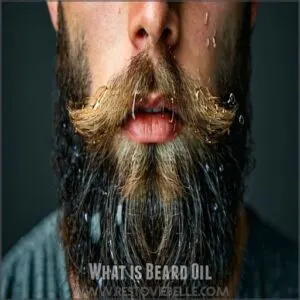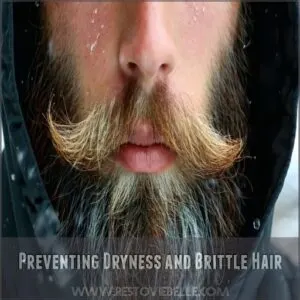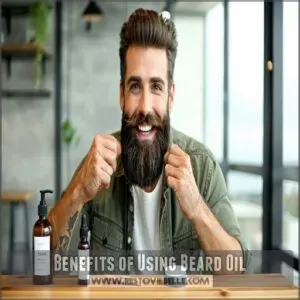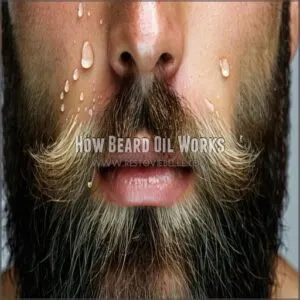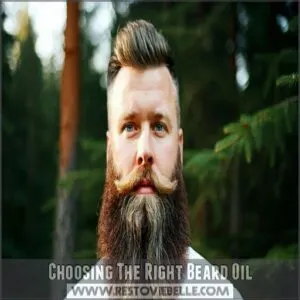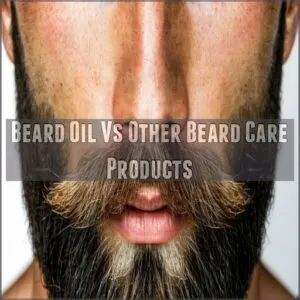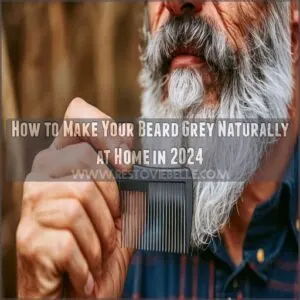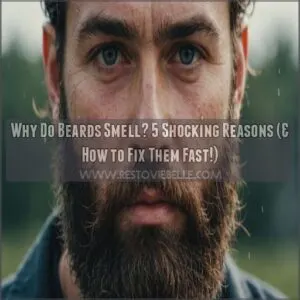This site is supported by our readers. We may earn a commission, at no cost to you, if you purchase through links.
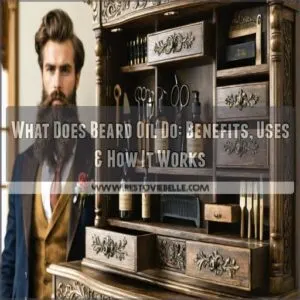 So, what does beard oil do? It’s your beard’s best friend.
So, what does beard oil do? It’s your beard’s best friend.
You see, beard oil acts like a natural moisturizer, softening those coarse hairs and hydrating the skin underneath. It tackles dryness and itchiness, leaving your beard looking and feeling amazing.
Think of it as a superhero for your facial fur, fighting off dandruff and promoting healthy growth.
It even adds a touch of shine, making your beard easier to style.
Want to know the secrets to choosing the perfect oil and applying it like a pro? We’ll show you how to reveal your beard’s full potential.
Table Of Contents
- Key Takeaways
- What is Beard Oil
- What Does Beard Oil Do
- Benefits of Using Beard Oil
- How Beard Oil Works
- Choosing The Right Beard Oil
- Applying Beard Oil Effectively
- Common Beard Problems Solved by Beard Oil
- Beard Oil Vs Other Beard Care Products
- Maintaining and Storing Beard Oil
- Making Your Own Beard Oil
- Frequently Asked Questions (FAQs)
- What are the benefits of using Beard oil?
- Does castor oil help with the growth of a beard?
- How do beard oils work?
- What is a modern Beard oil?
- Who should use beard oil?
- Does oil work on Beard & Face?
- Is beard oil really necessary?
- Is it good to use beard oil daily?
- Does beard oil grow a beard?
- What are the disadvantages of beard oil?
- Conclusion
Key Takeaways
- You’ll love how beard oil softens coarse hairs and hydrates your skin, effectively tackling dryness and itchiness.
- It acts as a natural remedy for beard dandruff and itch, ensuring your beard is comfortable and problem-free.
- By promoting healthy growth, beard oil turns your scraggly strands into a sleek, manageable masterpiece.
- Choose wisely when picking a beard oil, focusing on natural ingredients to avoid unwanted chemicals and ensure optimal beard health.
What is Beard Oil
For keeping your beard looking sharp and feeling soft, beard oil is your best wingman, acting as a leave-in conditioner that nourishes both the hair and the skin underneath.
Beard oil prevents dryness and itch, leaving you with a beard that’s not just impressive but comfortable too.
Made with a blend of carrier and essential oils, it prevents dryness and itch, leaving you with a beard that’s not just impressive but comfortable too.
Definition and Purpose
Beard oil is like a secret weapon for your facial hair.
It’s a lightweight, leave-in conditioner that keeps your beard soft, hydrated, and in tip-top shape.
By mimicking your skin’s natural oils, it tackles dryness and itchiness, ensuring your beard looks lush and feels smooth.
In short, it’s the cornerstone of effective beard care and grooming.
Ingredients and Composition
Basically, beard oil is crafted from a delightful mix of carrier and essential oils.
When shopping for beard oil, you can explore various brands that offer unique blends of these ingredients at beard oil stores online.
Here’s the scoop on these key players:
- Carrier Oils: Jojoba and argan oils hydrate your skin and beard.
- Essential Oils: Think tea tree or lavender for fragrance and benefits.
- Natural vs. Synthetic: Opt for natural to skip unwanted chemicals.
Importance in Beard Care
Keep your beard game strong.
Beard health thrives with the right care, and beard oil‘s a must-have.
It hydrates, battles dandruff, and boosts beard growth while keeping you stylish.
Beard oil is typically a blend of carrier oils, essential oils, and sometimes fragrances, which combats itchiness and dandruff.
| Need | How Beard Oil Helps | Benefit |
|---|---|---|
| Dry skin | Moisturizes | Healthy glow |
| Itchy beard | Soothes | Comfort |
| Scraggly hairs | Tames | Sleek look |
| Dandruff | Fights flakes | Clean |
| Unruly beard | Styles | Neatness |
What Does Beard Oil Do
So, you’re wondering what beard oil actually does?
It’s basically a super-hydrating conditioner for your beard and the skin underneath.
It tames that unruly mane and leaves you feeling (and smelling) great.
Moisturizing and Hydrating Effects
You know the drill: you’ve cleaned up your beard, but it’s dry as a desert.
This is where beard oil steps in, quenching thirst with hydrating goodness.
It’s like a drink for your face, tackling that dreaded itch and ensuring your skin’s hydrated.
With each application, enjoy a softer, manageable beard that’s better looking and feeling great.
Preventing Dryness and Brittle Hair
A dry beard can feel like a desert; beard oil is your oasis.
Hydration is essential to prevent dryness and brittle hair.
You can find various products that specialize in dry hair beard care.
Here’s how beard oil benefits you:
- Nourishes: It locks in moisture for soft, manageable hair.
- Conditions: Soothes dry skin underneath.
- Protects: Shields against environmental damage, keeping your beard healthy and resilient.
Reducing Beard Dandruff and Itch
Fed up with beard dandruff and that relentless itch that sneaks up out of nowhere? Beard oil is your best friend here. It acts as a natural remedy, hydrating dry skin and preventing itch by locking in moisture. Naturally combating beard dandruff, this magic potion relieves itch like nothing else. Embrace comfort and confidence, say goodbye to that flaky trouble!
| Problem | Solution | Benefit |
|---|---|---|
| Beard dandruff | Beard oil | Prevents flakes |
| Itchy beard | Beard oil | Provides relief |
| Dry skin | Beard oil | Hydrates deeply |
| Uncomfortable | Beard oil | Promotes comfort |
Benefits of Using Beard Oil
Using beard oil transforms your facial hair from scraggly to sophisticated, helping to soften those unruly strands while promoting healthy growth.
With its shine-enhancing properties, you’ll maintain a beard that’s easier to manage but also smells fantastic, leaving you confident to tackle anything from board meetings to brunch dates.
Promoting Healthy Beard Growth
Imagine your beard as a garden; it needs proper care to thrive.
Beard oil acts like a nourishing fertilizer, rich in natural oils and vitamins that support healthy beard growth.
A good diet and stress management also play key roles, but a few drops of beard oil can make a big difference in keeping your beard lush and vibrant.
Softening and Taming Scraggly Hairs
Dealing with a bushy, unruly beard can feel like battling a wild jungle, but beard oil is your trusty machete.
This magical potion softens those scraggly hairs, making them more manageable and inviting.
With just a few drops, you tame the chaos, turning your beard into a sleek masterpiece.
Think of it as nature’s conditioner, smoothing the way to effortless style.
Adding Shine and Managing Beard Hair
Want a beard that shines like a freshly polished penny?
Beard oil‘s your secret weapon!
A few drops add noticeable shine, making your beard look fuller and healthier.
Plus, it helps tame unruly hairs, making styling a breeze.
Say goodbye to scraggly strands and hello to a more manageable, impressive beard.
It’s a simple step in your beard grooming routine that delivers big results.
How Beard Oil Works
When you use beard oil, it works by mimicking the body’s natural oils, ensuring your beard stays hydrated and soft.
Beard oil helps tackle beard issues like itchiness and dandruff, making maintenance a breeze.
By combining carrier and essential oils, it helps tackle beard issues like itchiness and dandruff, making maintenance a breeze.
Replicating Natural Oils in The Skin
You’re using beard oil to mimic your skin’s natural sebum production.
When your skin runs low on its oils, the beard oil steps in, keeping your face hydrated and your hair nourished.
This nifty potion does wonders for beard health—stopping it from looking as thirsty as a dry desert, which definitely helps with smoother hair growth.
Carrier Oils and Essential Oils
Think of carrier oils in beard oil as the unsung heroes, quietly doing the heavy lifting by moisturizing and smoothing your beard, much like a good friend who’s always there.
Essential oils swoop in with aromatic flair, enhancing your beard’s health and charm.
Choosing the right blends can feel like crafting your personal recipe for beard greatness.
Role in Preventing Beard Problems
What’s the secret to tackling beard problems like dandruff, itch, and dryness?
Beard oil‘s your best buddy.
Those carrier and essential oils tag-team to replicate your skin’s natural oils, reducing hair breakage and improving skin health.
They’re like the superheroes of beard care, swooping in with acne control and itch relief, keeping your beard luscious and problem-free.
Choosing The Right Beard Oil
Picking the right beard oil isn’t just about grabbing the first bottle you see—consider your skin type and beard length to make sure it suits your needs.
Opt for natural ingredients and pleasant fragrances, and steer clear of synthetic preservatives and dyes to keep your beard both healthy and happy.
Considering Skin Type and Beard Length
Finding the right beard oil involves considering your skin type and beard length.
Tailor your choice for:
- Oily skin: Light oil to prevent a greasy feel.
- Dry skin: Richer oil for hydration.
- Short beards: Minimal application, spread evenly.
- Long beards: More oil to cover length.
- Beard oil frequency: Adjust based on dryness or oiliness.
Opting for Natural Ingredients and Fragrances
So, you’ve considered your beard’s needs and your skin type.
Now, let’s talk ingredients.
Look for natural oils like jojoba or argan—they’re your best bet for a healthy beard.
Natural ingredients mean fewer worries, and many essential oils offer fantastic fragrance benefits, too.
Plus, a DIY beard oil is surprisingly easy.
You’ll love the smell and the results!
Avoiding Synthetic Preservatives and Dyes
Choosing the right beard oil isn’t just about fragrances; it’s about what you’re avoiding too.
Ditch synthetic preservatives and dyes for a healthier grooming routine.
Some common ingredients to steer clear of, like sulfates and mineral oil, can cause long-term hair damage and hormone disruption, as seen in certain hair care products with harsh ingredients to avoid in hair care.
Look for beard oils that:
- Avoid parabens and synthetic chemicals
- Use natural oils and safe fragrances
- Prioritize organic ingredients
- Promise toxic-free grooming
- Focus on simple, effective formulas
Keep your beard—and the skin beneath—happy and healthy.
Applying Beard Oil Effectively
Applying beard oil effectively is as easy as spreading butter on toast, making sure every crumb is covered and shiny.
You’ll want to massage a few drops into your beard daily, ensuring both hair and skin get the gentle hug they deserve.
Directions for Use and Frequency
You’ve settled on the best beard oil, now let’s talk about how to apply it.
Start with a couple of drops, adjusting according to your beard length and the climate.
Use your hands to massage the oil into your beard, doing this every other day.
If it’s a dry spell outside, go ahead and add more as needed.
Tips for Even Distribution and Absorption
Getting beard oil to spread evenly is an art. Here’s the blueprint:
- Prep those hands: Warm a few drops of oil between your palms—think of it as a mini sauna for your hands.
- Front and center: Start at the beard center, massage in gentle circles.
- Comb it out: Use a beard comb for even coverage.
Combining With Other Beard Care Products
Think of beard oil as the foundation of your beard care routine.
Start with a beard wash, then apply the oil to tame and moisturize.
Finish up with a beard balm or wax for styling.
A beard comb helps distribute everything evenly.
This combo helps your beard look its best, boosting both confidence and growth.
Common Beard Problems Solved by Beard Oil
For solving common beard issues like dandruff, itchiness, and dry or brittle hair, beard oil is your trusty sidekick.
It hydrates and softens your scruff, but also tackles skin irritations and pesky beard acne, leaving your facial hair looking and feeling its best.
Beard Dandruff and Itch
Ever felt like your beard’s staging a rebellion with constant itching and dandruff flakes?
That annoying itch can be a sign of dry skin underneath your beard.
Here’s where beard oil shines as your trusty sidekick.
By moisturizing, it tackles dandruff head-on, offering smooth relief and a luxuriously soft beard that’s hard to ignore.
Dry and Brittle Hair
If you’ve ever battled beard dandruff, you know dry, brittle hair can be a pain too.
Natural oils in beard oil are your secret weapon, fortifying and conditioning each strand like tiny armor.
It smooths out those rebellious frizzies and mends split ends, leaving your beard soft and strong—a comforting embrace for your face that boosts confidence effortlessly.
Acne and Skin Irritation
Experiencing beard acne can feel like battling a tiny, rebellious army on your face.
Beard oil steps in as a trusty ally, soothing irritation with its hydrating blend.
To minimize risks of breakouts, consider choosing the right beard oil, as certain ingredients can clog pores and trigger acne.
Natural ingredients like tea tree oil cleanse pores, helping zits retreat.
Regular application not only tackles skin problems but also helps keep your beard soft.
Just don’t overdo it—your skin needs to breathe!
Beard Oil Vs Other Beard Care Products
When you’re faced with the jungle of beard care products, understanding the differences between beard oil, balm, and wax can make all the difference.
Think of beard oil as your daily moisturizer,
while balm and wax come into play when you’re sculpting that masterpiece for date night or just outshining the guy next door.
Comparing Beard Oil and Beard Balm
When comparing beard oil and beard balm, consistency is key.
Beard oil offers softness and conditioning, ideal for daily application.
Balm, however, provides a thicker consistency for more hold and a controlled look.
Here’s a quick rundown:
- Consistency: Oil is light, balm is thick.
- Application: Oil for conditioning, balm for shaping.
- Benefits: Oil promotes softness; balm manages unruly hairs.
Differences Between Beard Oil and Beard Wax
Comparing beard oil and beard wax is like choosing between a gentle rain and a blustery wind.
Beard oil is for conditioning and shine, bringing softness.
Beard wax, however, demands control, giving robust styling power.
When deciding between the two, it’s helpful to explore products like those found in a beard oil vs balm comparison.
Here’s a quick look:
| Feature | Beard Oil | Beard Wax |
|---|---|---|
| Texture | Smooth and Light | Thick and Solid |
| Hold | Minimal Styling | Strong Hold |
| Application | Daily Conditioning | Special Occasions |
| Purpose | Moisturizing | Shaping |
| Finish | Glossy | Matte |
Choosing The Best Product for Your Beard
Your beard’s unique needs guide your product choice.
Consider your beard type: short and stubbly or long and luxurious?
Beard oil’s great for everyday moisture, while balm adds hold, and wax styles unruly beards.
Think about scent preferences, your budget, and the brand’s reputation.
Natural ingredients are key for healthy growth and softness.
Find the perfect fit for your style and wallet!
Maintaining and Storing Beard Oil
You’re investing in your beard care, so it makes sense to treat your beard oil with care by storing it in a cool, dark place, which helps preserve its shelf life and potency.
Replacing expired oil and keeping the bottle clean guarantees your beard benefits from the freshest, healthiest oil possible.
Storage Tips and Shelf Life
For longer shelf life and freshness, choose a glass bottle over plastic, offering better UV protection.
When storing, consider following guidelines similar to those for maximizing mongongo oil shelf life, keeping your beard oil cool and out of direct sunlight to dodge oxidation.
Clean the bottle’s nozzle occasionally to prevent buildup.
Using quality ingredients, your oil will nourish dry skin and enhance sheen—like a trusty sidekick for your grooming adventures.
Replacing Old or Expired Beard Oil
You found a half-empty bottle of beard oil, and you’re wondering if it’s still good. Checking for expired oil is key to keeping your beard in top shape.
- Sniff Test: Has the scent changed?
- Texture Change: Is it thicker or separated?
- Color Shift: Has the oil darkened?
- Expiration Date: Passed?
- Usage Decline: No longer effective?
Catch these signs early and replace as needed!
Cleaning and Caring for Your Beard Oil Bottle
Don’t let old oil taint your fresh beard brew! Keep your bottle sparkling to avoid oil contamination.
Sanitize the bottle before refilling, focusing on dropper maintenance.
Proper storage preserves quality—keep it cool and dark.
Labeling tips help track shelf life, ensuring you always enjoy pristine beard oil.
| Task | Tip |
|---|---|
| Bottle Sanitizing | Use soapy water |
| Oil Contamination | Refill with care |
| Proper Storage | Cool, dark place |
| Dropper Maintenance | Clean regularly |
| Labeling Tips | Note dates |
Making Your Own Beard Oil
Want to save money and create a beard oil perfectly customized to your preferences?
You can easily whip up your own blend at home using carrier and essential oils, customizing the scent and benefits to your liking.
Selecting Carrier Oils and Essential Oils
Curious about the secret to a perfect beard oil blend?
Start with carrier oil benefits: 1. Jojoba oil mimics natural skin oils, 2. Argan oil adds shine and softness, and 3. Coconut oil offers deep hydration.
Add essential oils for fragrance options and potency—lavender for calm, sandalwood for warmth.
Select neutral scents to create a personalized, unique aroma that suits your style.
Blending and Mixing Your Own Beard Oil
Crafting your own beard oil is like cooking up magic potions. Start with perfect beard oil ratios: a few drops of essential oils blended with tablespoons of carrier oils.
Experiment with fragrance layering and unique oil infusion methods.
Create a mix that suits your style—bold or soothing.
| Essential Oils | Carrier Oils | Fragrance Notes |
|---|---|---|
| Lavender | Jojoba | Earthy, Calming |
| Tea Tree | Argan | Fresh, Medicinal |
| Sandalwood | Almond | Warm, Woody |
Benefits and Drawbacks of Homemade Beard Oil
Opting for homemade beard oil gives you control over cost, quality, and customization. You can choose ingredients that promote beard growth, such as those that nourish hair follicles.
But there are a few snags:
- Quality Control: You bear the brunt of ensuring the best beard oil ingredients.
- Allergic Reactions: Missteps in mixing could spark an itchfest.
- Shelf Life: Unlike store-bought, homemade lacks preservatives for longevity.
Despite this, many love the DIY touch!
Frequently Asked Questions (FAQs)
What are the benefits of using Beard oil?
Ever wonder if beard oil really makes a difference?
It sure does.
It softens your beard, prevents dandruff, and soothes itchy skin.
Plus, it adds shine and a fresh scent, making your beard more manageable and appealing.
Does castor oil help with the growth of a beard?
Castor oil might give your beard a growth boost by nourishing hair follicles and promoting circulation.
Though not a magic potion, its thickness locks in moisture, potentially supporting fuller, healthier facial hair over time.
How do beard oils work?
Who knew oiling your beard could be as important as oiling a rusty hinge?
Beard oils mimic your skin’s natural sebum, moisturize hair and skin, reducing itch, and adding shine.
They help manage your beard’s wild side.
What is a modern Beard oil?
Modern beard oil? It’s like a superhero for your beard and face.
It moisturizes, softens, and smells amazing, taming that wild mane into something truly magnificent.
You’ll look and feel your best.
Who should use beard oil?
If you’ve got a beard, you should consider using beard oil to keep it soft and manageable.
It’s perfect for preventing itchiness, dandruff, and dry skin, making your beard healthier and your grooming routine hassle-free.
Does oil work on Beard & Face?
Beard oil keeps your beard and face hydrated and healthy.
It mimics natural skin oils, soothing dryness and reducing irritation.
You’ll notice a softer beard and less itchiness, making beard maintenance much easier and more comfortable.
Is beard oil really necessary?
Necessity depends on your hair goals.
A scruffy beard can seem rugged, but if you crave smoothness and shine, beard oil works wonders, adding moisture and tackling itchiness, perfect for keeping your beard in shape.
Is it good to use beard oil daily?
Using beard oil daily can be a game-changer, keeping your beard soft, itch-free, and healthy.
It’s like giving your facial hair a revitalizing boost, making it look fuller and more manageable, while pampering the skin underneath.
Does beard oil grow a beard?
Imagine your beard as a garden; while beard oil doesn’t sprout new growth, it nourishes and cares for what exists, making it healthier and fuller.
Keep your facial mane tamed and vibrant with this conditioning friend.
What are the disadvantages of beard oil?
Some oils might clog pores, causing irritation. Too much oil can leave your beard greasy. Rarely, certain ingredients could trigger allergic reactions. Choose wisely, my friend!
Conclusion
Reveal your beard’s potential with the magic of beard oil.
Like a trusty companion, it softens, moisturizes, and tames your facial hair, tackling dryness and itching with ease.
Embrace the benefits of healthy growth and a touch of shine, transforming your beard care routine into a simple, effective ritual.
Whether you’re new to the game or a seasoned beard enthusiast, knowing what beard oil does sets you on the path to a truly magnificent beard, with a trusty companion by your side.
